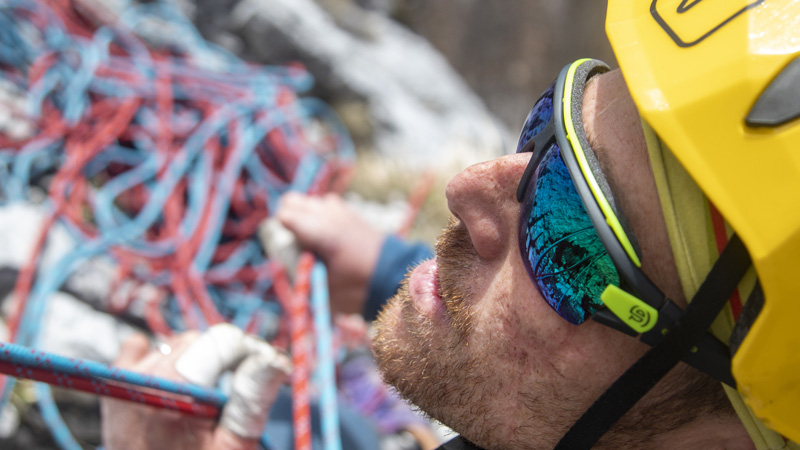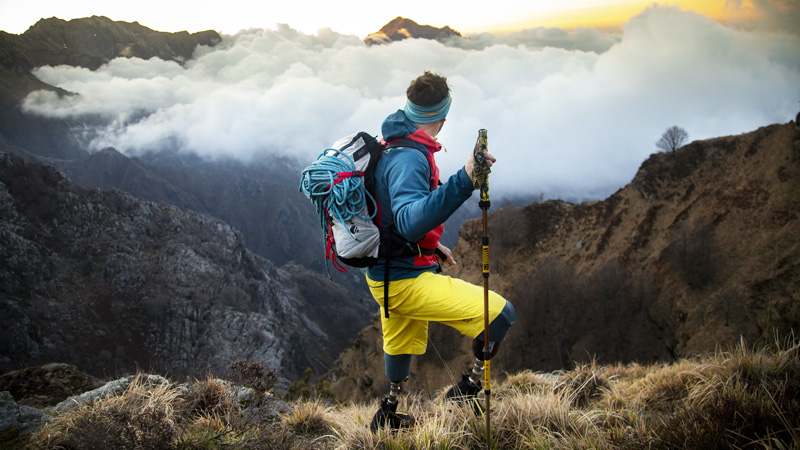 Photo by Ilaria Cariello
Photo by Ilaria Cariello
Life changed forever for Andrea Lanfri in 2015 when meningitis led to the loss of both of his legs and seven fingers. He has since successfully built a new life as an award-winning athlete and mountaineer, making history when he became the first athlete with multiple amputations to reach the summit of Mount Everest.
Since 2020, he has undertaken several challenges as part of his 0 to 0 project. Each challenge involves starting at sea level, cycling to a mountain, climbing non-stop to the summit, then returning to the starting point as quickly as possible.
On the 24th of April, he will be making the round trip from Forte dei Marmi, in Tuscany to the fourth highest peak in the Apuan Alps, Pania della Croce, and back again without stopping, in the fastest possible time.
Andrea tells us more about life after meningitis, the reason he shares his story and his latest challenge.
How much did you know about meningitis before you had it?
I didn't know anything about meningitis before I had it. It all happened suddenly, the night before I was fine, the next morning I woke up very cold and the more hours went by the higher the fever and I had difficulty walking. When I saw the fever at 43.5, I called my mother and the doctor, I don't remember their arrival, but I woke up a month and a half later in the hospital. At first, I didn't understand why I was there but then it was explained to me: fulminate meningococcal sepsis.
How did you feel when you realized you were going to need amputations?
When I woke up in the hospital the doctors had not yet performed the amputation, because my situation was stable and slightly improving and they tried to save as much as possible. Then a few months later the situation worsened, and the doctors were forced to amputate to save my life. In reality I couldn't wait, for me having my limbs so compromised was a constant pain and when I woke up after the operation, I felt good.
You have contributed to Meningitis in your words, a digital collection of meningitis experiences from across the world. We are calling for 2,030 people to share their story to offer hope, foster understanding about meningitis and ignite action. What is your reason for sharing your story?
My desire is to inform as many people as possible about this disease, which is so little known and underestimated here in Italy and beyond. However, my desire is also to instil hope and fortitude in all those people who, like me, have found an enormous obstacle to climb in their life journey.
What is something about meningitis that you wish everyone knew?
It’s speed and how it can catch you off guard. Everything really happens so fast that if you don't know meningitis well, there is a real danger that this bacterium will take your life away.
Tell us about the 0 to 0 project challenge. Why did you decide to do this?
I started in 2020 because in my own way, I like to challenge meningitis. Every year on April 24th I like to do an activity that will remain within me forever, of strong emotion. Every adventure taken, mountain climbed, and day spent in the open air is a further defeat to this disease that tried to stop me but never succeeded.
I wanted a project that could combine my passions of mountain climbing, cycling and running. This challenge is unique. There are those who go from the sea to the mountains. But no one even makes the return.
 Photo by Ilaria Cariello
Photo by Ilaria Cariello
How many times have you done this challenge before?
I’ve done the challenge five times in total, on other mountains and on other occasions. There will definitely be other editions in the future, it's a very beautiful adventure format that can be adapted anywhere. I also like his philosophy: we start from 0 and end at 0, but between the two points, its beauty lies in the journey. It's a bit like a philosophy of life, you are born, and you die, but the beauty is between the two. Travel.
Your next challenge takes place on April 24th, can you tell us about it?
The project involves covering the distance from the sea to the mountain by bicycle, quickly changing gear (shoes/feet/blades/prosthetics) and non-stop climbing the summit and back before running back to the starting point in the shortest possible time.
This challenge is about 60km in total. I think it will take between 8 to 10 hours in total, non-stop.
What are the biggest challenges you will have to overcome?
The mountain is not very high, but it is on very treacherous terrain.
Running, cycling and climbing a lot, non-stop with prosthetics, is always a great challenge.
How is each challenge different to the others?
Different places, different mountains. different bike roads and mountain roads where I also run. I also sometimes like to try out new prosthetics.
What’s next?
These projects have always been an excellent training ground for bigger adventures. This one will be my last training for an expedition I will do a week later in Alaska trying to climb Denali.
Read Andrea's story, written in his own words, in Meningitis in your words.